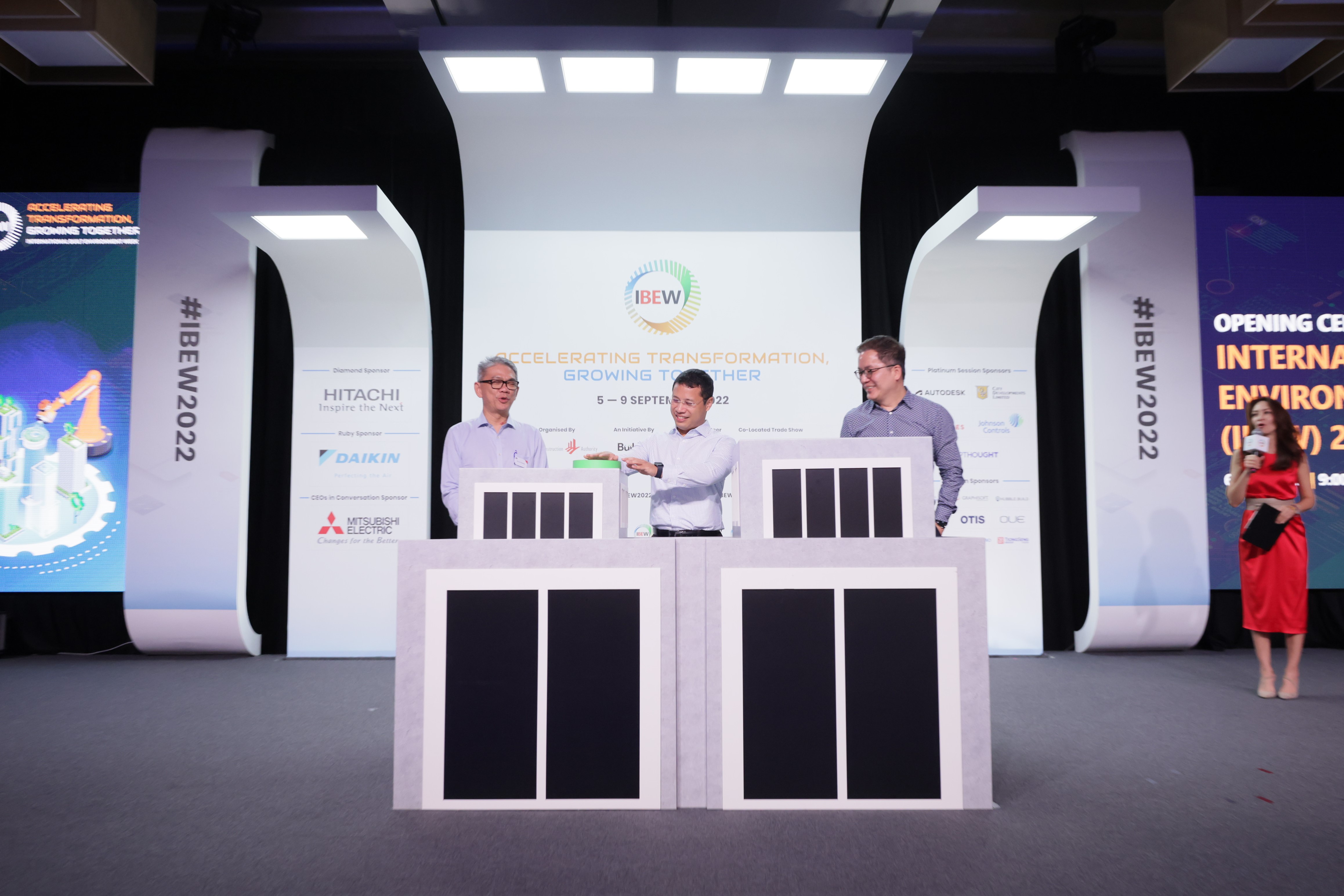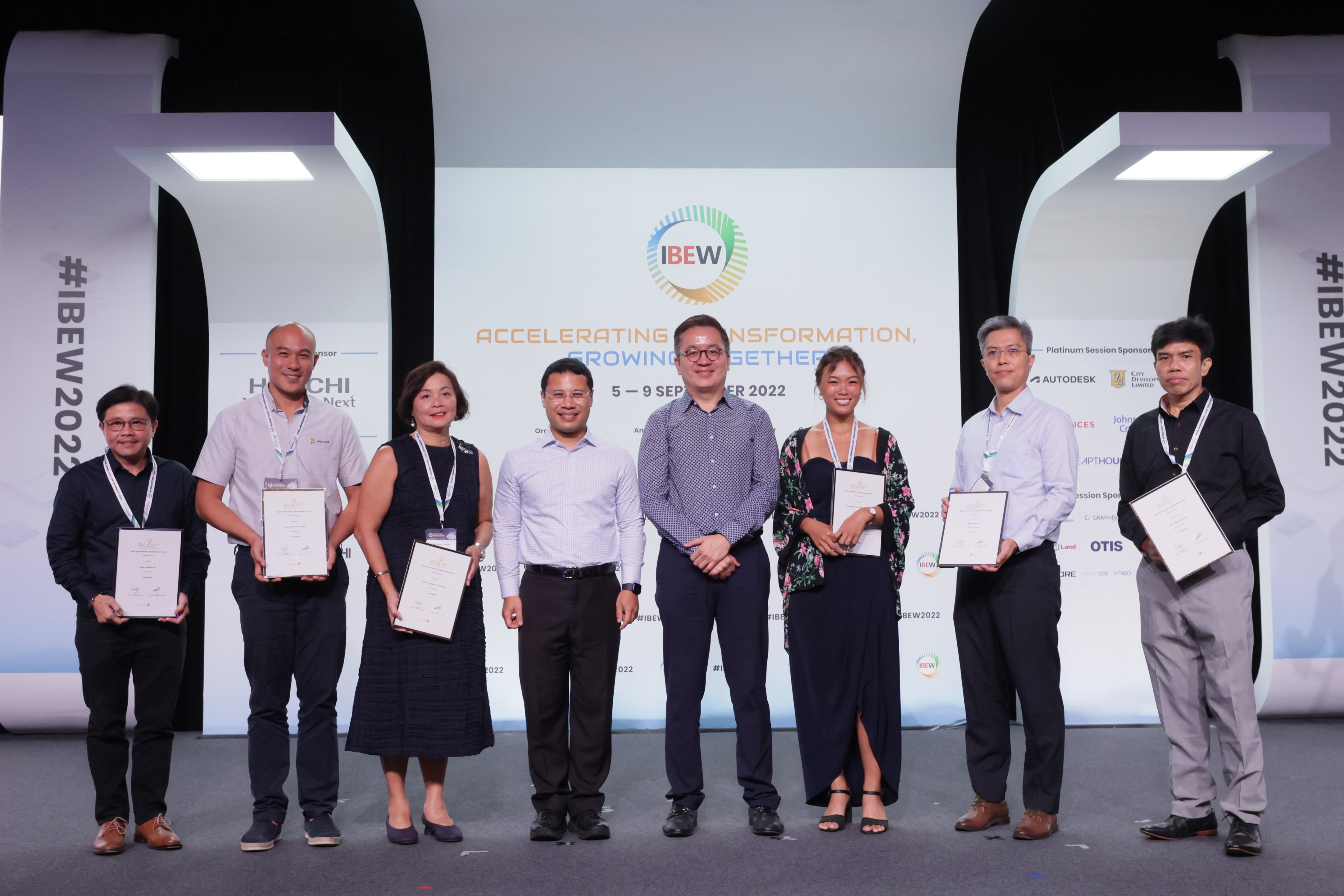Featuring cutting-edge technology like an open digital platform that connects buildings and a smart energy grid adopting clean sources of energy, JTC’s futuristic Punggol Digital District project will be one of many firsts.
This construction project is leading the way with collaborative contracting – a practice promoted by the Building and Construction Authority (BCA). It encourages stakeholders to work together to resolve differences, develop solutions and share risks to meet common project goals.
Collaborative contracting includes early warning mechanisms to strengthen communication and structured dispute resolution processes. Government agencies have identified nine more upcoming projects to pilot it.
“We can achieve more by working together upstream to optimise downstream processes in construction and maintenance,” Minister for National Development Desmond Lee announced at the opening ceremony of the International Built Environment Week (IBEW) 2022 on 6 September.
Integrated Planning and Design (IPD), the first of three key transformation areas covered by the refreshed Built Environment Industry Transformation Map (ITM), involves closer collaboration within the Built Environment (BE) sector. It builds on the existing use of digital technology to link stakeholders, or Integrated Digital Delivery.
The new roadmap – a combination of two separate ITMs launched previously – seeks to foster alliances and uplift stakeholders across the BE value chain for greater productivity, resilience and sustainability.
“Accelerating Transformation and Growing Together” was the theme of this year’s IBEW, which was held in person for the first time since 2019 at the Marina Bay Sands Expo and Convention Centre.
While the pandemic has led to manpower shortages and cost increases, the sector has weathered the storm through close partnerships and mutual support – on top of S$1.36 billion in government aid.
“We are on track to achieving the projected construction demand of between $27 billion and $32 billion this year and meeting existing targets under the previous Construction Industry Transformation Map,” said Mr Lee.
BCA estimates the total projected construction demand to be sustained at between $25 billion and $32 billion per year from 2023 to 2026, he added.
|
|
 Minister for National Development Desmond Lee (centre) officiating the start of IBEW 2022.
Minister for National Development Desmond Lee (centre) officiating the start of IBEW 2022.
|
|
Refreshing the roadmap for transformation
The new ITM seeks to transform all stages of a building’s life cycle – planning and design, construction, operations and maintenance. Ensuring that all three stages were accounted for involved consultations across the entire value chain with over 2,500 partners from BE firms, Institutes of Higher Learning and government agencies.
Besides IPD, two other key transformation areas underpin the new BE ITM: Advanced Manufacturing and Assembly (AMA) and Sustainable Urban Systems (SUS).
AMA promotes manpower-efficient technologies in the construction process, reducing firms’ reliance on low-skilled foreign manpower and raising productivity.
To achieve this, BCA aims to increase the Design for Manufacturing and Assembly (DfMA) adoption rate from 44 to 70 per cent by 2025 and establish new Integrated Construction Parks (ICPs) across Singapore.
Housing different construction facilities in one location, ICPs help businesses build faster and better. For instance, raw materials such as cement can be sent to Ready-Mixed Concrete batching plants using mechanised conveyor systems under one roof, instead of being hauled across the island in a fleet of heavyweight vehicles.
Singapore’s first ICP trial at Jurong Port will progressively begin operations by the end of 2022.
Finally, BCA will ramp up decarbonisation efforts under SUS through the use of Integrated, Aggregated and Smart Facilities Management (FM), which taps on technology to ensure buildings remain energy-efficient.
The $30 million Integrated Facilities Management (IFM) and Aggregated Facilities Management (AFM) Grant for firms are now open for applications.
“The Singapore government will continue to take the lead on this front by adopting Smart FM in our public buildings. We have set more ambitious targets of 80 per cent of public buildings and 40 per cent of private buildings adopting Smart FM by 2030,” announced Mr Lee.
A value-chain approach to transformation
|
|
 Presenting the inaugural Built Environment Transformation Award to the project team behind The Tapestry, a condominium in Tampines. Presenting the inaugural Built Environment Transformation Award to the project team behind The Tapestry, a condominium in Tampines.
|
|
Unlike other sectors of the economy, the BE value chain is longer and more complex, requiring a deep level of trust between stakeholders for the whole network to function optimally, observed Mr Lee.
Championing a “value-chain approach”, BCA has developed the Growth and Transformation Scheme to support long-term partnerships between firms and their value-chain partners. Under this scheme, stakeholders are expected to meet a set of common transformation outcomes in their projects.
To recognise projects that epitomise the new transformation areas under the refreshed ITM, the newly-launched Built Environment Transformation Awards were presented to the project teams at the IBEW Opening Ceremony. The four winners are:
- PSA Liveable City;
- Eunoia Junior College;
- JTC’s 1 and 7 North Coast developments in Woodlands North Coast; and
- The Tapestry, a condominium in Tampines.
Said Mr Lee: “For the BE sector to do well and weather future crises of this scale, we need to transform and digitalise. These efforts are ultimately underpinned by human factors: trust, understanding, collaboration and the sense that we can only succeed if we work together.”